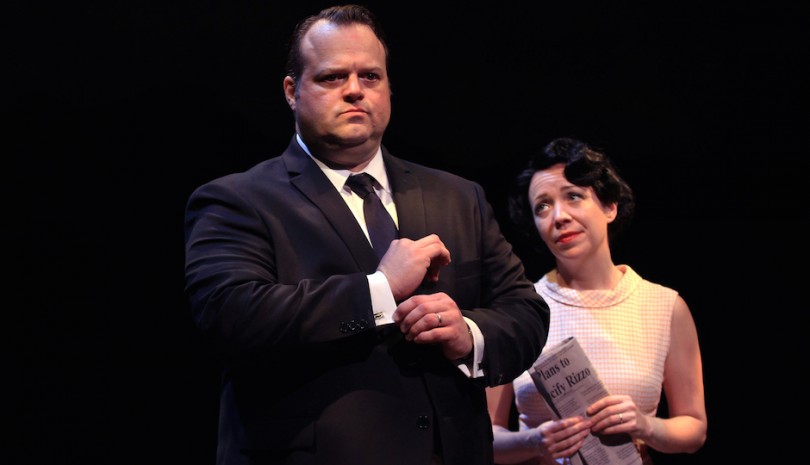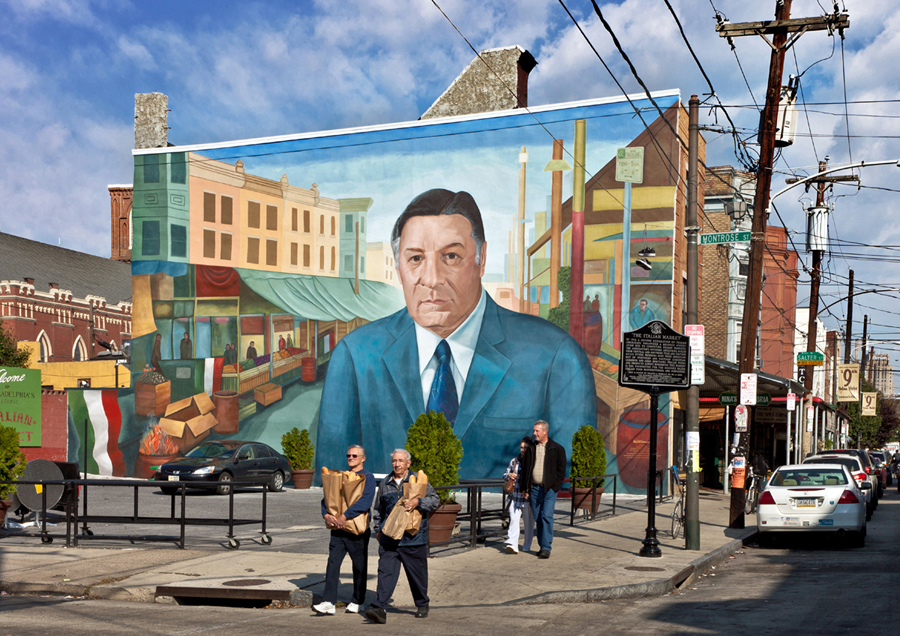
Rizzo, by Bruce Graham, Theatre Exile in Philadelphia, 2015 & Philadelphia Theatre Company, 2016
My wife grew up in Albuquerque New Mexico and didn’t know the history of Frank Rizzo and the intense emotions that Philadelphians had about him. Yet she was fascinated by the broad appeal of this play by Bruce Graham.
Most Philadelphians, of course, remember Frank Rizzo as the burly cop from South Philly who rose to be mayor from 1972 to 1980. He did so while intimidating minority groups, especially blacks and liberals. Rizzo publicly urged the electorate to “Vote white!” Many called him a bigot or a fascist, but he was a hero to middle class and lower class whites who loved him for the enemies that he made.
Much like Donald Trump, Rizzo threw his weight around with boasts and insults. “I’ll make this city great again.” He bullied judges, threatened civic leaders and politicized the school board. Former Mayor and School Board President Richardson Dilworth charged that Rizzo used police for political espionage.
Now, a quarter-century after Rizzo’s death, comes a stage piece about this intimidating figure. Playwright Bruce Graham takes us on an exciting journey through a tumultuous period. We hear Rizzo’s imprecations against “the scum” who are trying to take over his city, and he calls his opponents “mental cases” and “faggots.”
We also hear accusations against him by others. Because the negatives come from a variety of voices, most of them unfamiliar to today’s audiences, they don’t register as strongly as the words spoken by our protagonist. This tips the balance in Rizzo’s direction and gives him a favorable aura—especially when we hear him tell several funny (though insensitive) stories.
An example told by the Italian-American Rizzo to his Jewish pal Marty Weinberg: “How can you tell the difference between a Jewish wife and an Italian wife? The Italian has real orgasms and fake jewelry.”
But the play is tries to be even-handed, maintaining a balance of he-said versus she-said. The title character is totally self-assured, never questioning his own actions. There’s no introspection. Thus the play misses a chance to be even better.
When writing this work, the playwright had to be aware of the presence of many people who worship Rizzo’s memory. His grandson recently said the city is run by “a bunch of mediocre people” whereas “my grandfather had balls.”
Within these parameters, Graham wrote a fast-moving biography that’s consistently engrossing. Director Joe Canuso keeps things moving with action that’s clear and focused.
A couple of reflective scenes show Rizzo’s resentments against his strict father and his South Philly neighborhood where he endured anti-Italian insults. He fled that neighborhood and moved to a row home in northwest Philadelphia’s Mount Airy, near my family, in the 1960s. The script also portrays Rizzo’s antipathy towards the progressive policies of his predecessor as police commissioner, and his feeling that Mayor James Tate was “a pussy.”
Rizzo was proud of standing tough against anyone who didn’t respect him. His rule, however, was dictatorial. Particularly telling is the incident where he had union thugs prevent the Inquirer’s trucks from delivering newspapers because Rizzo didn’t like what the paper said about him.
It’s a shame that, in this play, no antagonist laid out a consistent case against Rizzo. It would have been good to hear some individual personify and give voice to the high percentage of South Philadelphians (almost all of whom were white) who turned against Rizzo. It also would have been interesting to hear more of an explanation from Weinberg about why he was a Rizzo supporter at a time when most Jews were concerned about civil liberties and opposed Rizzo.
I prefer Graham’s fictional plays which depict more conflict than this. Still and all, Rizzo is entertaining and the performances were superb, especially that of Scott Greer, whose hefty physique matches Rizzo’s. Damon Bonetti was impressive as a fictional Italian-American reporter who ties the narrative together, and so were Amanda Schoonover, Paul L. Nolan, Akeem Davis, Robert daPonte and William Rawhill in multiple roles.
When the play was re-mounted at the Suzanne Roberts Theatre by the Philadelphia Theatre Company, it gained strength through its deeper and more detailed stage setting. And — because this was 2016 — the parallels to Donald Trump were more noticeable.

Rizzo mural in South Philadelphia
See other reviews on The Cultural Crtic